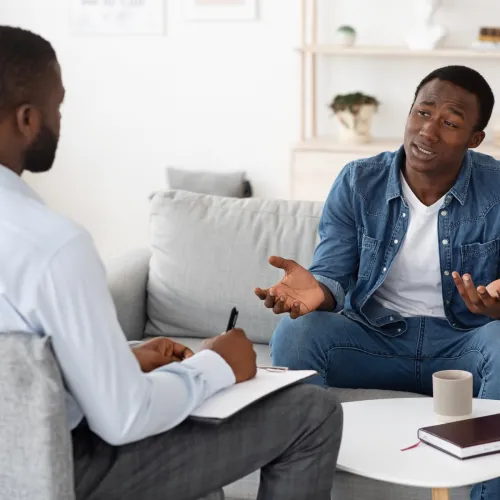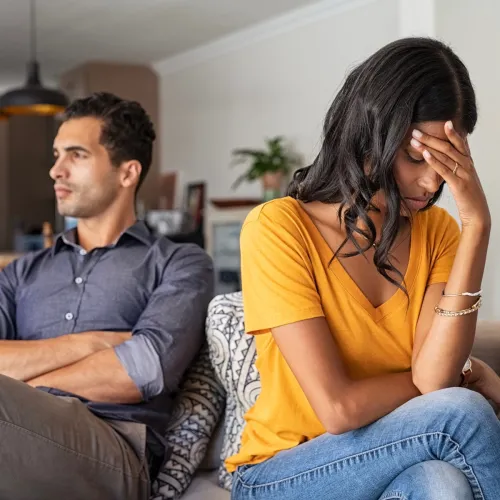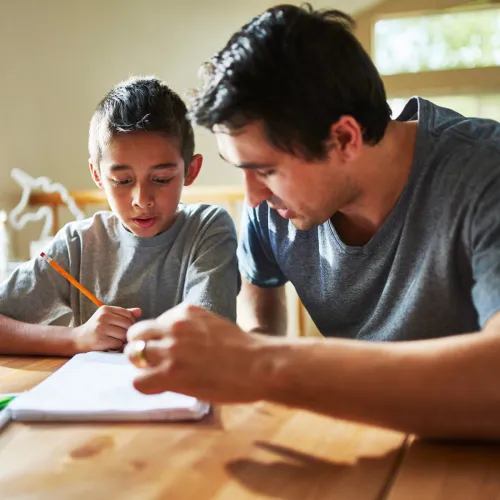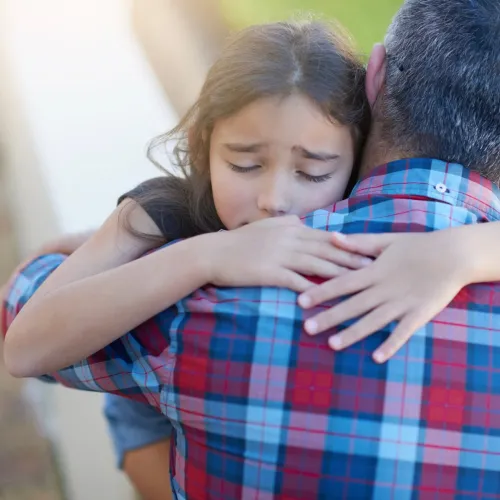The Transformative Power of Positive Childhood Experiences (PCEs)
Being a child of divorce can be traumatic—but that isn’t the whole picture. As a parent, you can create positive childhood experiences (PCEs) for your child, and those experiences can counterbalance any trauma by helping your child become resilient.
Adverse childhood experiences (ACEs)—another term for childhood trauma—can have lifelong effects, and kids with high ACE scores often struggle as adults. But kids with high ACE scores and high PCE scores tend to have much milder health outcomes.
Inside this article
- PCE #1: Feeling able to talk to your family about your feelings
- PCE #2: Feeling your family stood by you during difficult times
- PCE #3: Enjoying participating in community traditions
- PCE #4: Feeling a sense of belonging in high school
- PCE #5: Feeling supported by friends
- PCE #6: Having at least two non-parent adults who took genuine interest in you
- PCE #7: Feeling safe and protected by an adult in your home
What are ACEs and PCEs?
ACEs is another term for toxic stress and childhood trauma. ACEs can hurt a child throughout the rest of their life—physically, mentally, socially, and financially. Someone with a high ACE score is more likely to develop liver disease, have chronic depression, commit or be the victim of domestic violence, struggle to hold a job, and have a heart attack. This research has been around since the late 90s, and parental divorce is specifically named as an ACE.
But positive childhood experiences, or PCEs, do the exact opposite! They protect your child against stress factors that could otherwise overwhelm them.
One study found that PCEs “largely neutralize the negative effects of ACEs on adult health.”
As a guardian ad litem for 20 years, I've had the privilege and the opportunity to see children go from toddlers to school age to teenagers, to now, young adults. I’ve seen how the actions parents take during a divorce or separation truly impact the their children’s wellbeing, both immediately and long term. I’ve witnessed firsthand that kids with PCEs grow up more well-adjusted.
I know co-parenting can feel like a helpless experience, but these studies are incredibly empowering.
You may not be able to prevent the ACEs, but you absolutely can create PCEs. They’re actually pretty simple and straightforward.
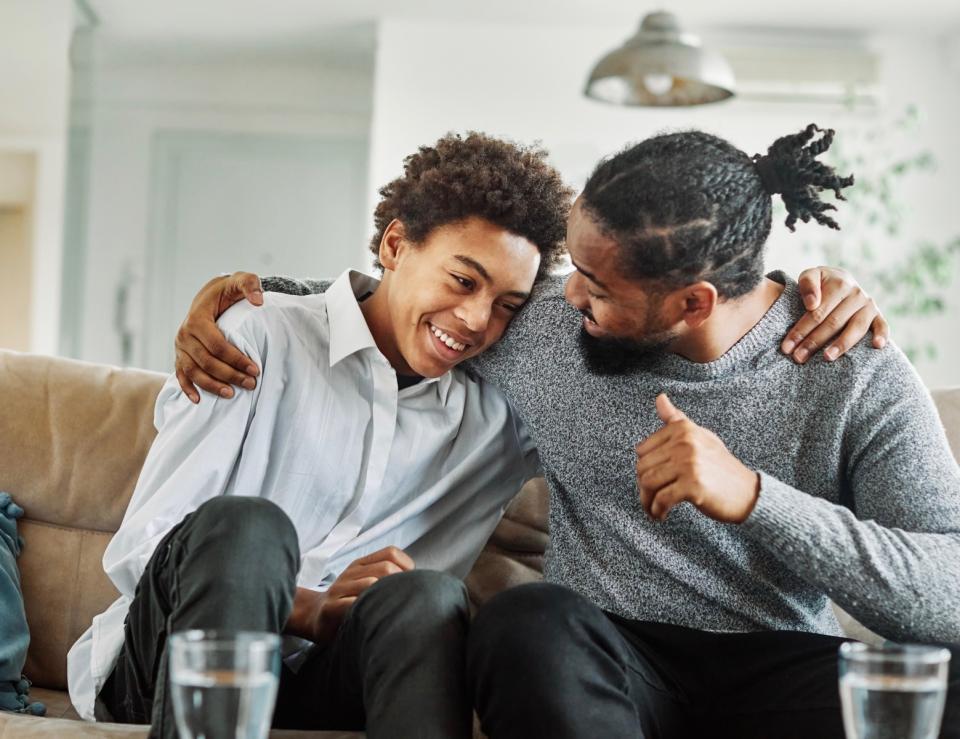
PCEs clarify what “the best interest of the child” really means
We talked with Dr. Christine A. Profito, a licensed clinical psychologist and qualified parenting coordinator working with the National Cooperative Parenting Center (NCPC). She shared her excitement about PCE research, especially as it applies to co-parenting.
“As tensions between divorced or separated parents rise, the ideas around what is the best interest of the children can be distorted a bit,” she explains. “‘In the child's best interest’ is super vague. And it just leaves so much room for people to interpret. And the higher the conflict is, the more creative liberties people can take.
“Now it’s super clear: These mitigating factors build resilience. Even if one parent is truly the worst of the worst, there are a lot of good things that the other parent can be doing to help the child.”
I’ve had kids tell me over and over again throughout the years, “I just want to be heard. I want my parents to sit down and listen to me. And I want to be able to say what's on my mind without judgment, without fear of hurting someone's feelings or betraying their trust.” These are very simple, basic things that children need to feel comfortable, safe, and secure.
Unfortunately, in a divorce, there’s so much going on that the process can be overwhelming and emotionally distracting. As a result, kids don’t get as much direct attention from their parents.
But it only takes five minutes a day of special time to make a huge difference, says Dr. Profito.
“During those five minutes of special time, we're just focused. We're not on our phones. We're not watching TV. We're just hanging out. You can play toys or cards or whatever your child likes.” You can even just take a walk or share a meal or cuddle. “But it's interactive, and you’re listening, and you’re excited to be there.
“That communicates, ‘I'm interested in you and all of the things about you, and I am here, and I am present.’ And that's all we need.”
Dr. Profito explains, “As parents, it is super easy to get into a doing mentality: ‘What do we need to do for homework? What do we need to do for dinner? What do we need to do to prepare for school tomorrow?’ And it's all action-oriented, and we miss the chance for reflection. Then we also hammer out commands, ‘Go do this, put this away, pick that up,’ and that's not super conversational.
“I think we think questions are conversational, but sometimes they can be very directive and it feels like you’re interrogating. When really, you want to have an organic, free-flowing conversation, so your child will tell you about their thoughts and feelings.
“Here’s one of the easiest ways to tell somebody you're listening: When they say something, you reflect it back at them, like, ‘Oh, sounds like you had a really good day!’ So I'm just telling you what you told me, but it tells you that I heard you and I listened.”
Sometimes this gets tricky, especially with older kids and teens. Sometimes, they’ll share stuff you don’t really like to hear.
“Special time doesn't mean you have to be a cheerleader with rose-colored glasses. But you’re communicating, ‘I'm here for you. You are free to talk to me about it. I'm not going to shame you or try to guilt you into behaving a different way. I'm just going to create a safe space for you to explore these thoughts and feelings, and change your mind back and forth, and if you want my opinion, you know I can offer that.”
What's most important for your child is for them to know that you love them, no matter what, and you will always be there for them, to support them and be their #1 fan. If your child knows that and feels that, then your child's going to be okay.
This PCE flows from the previous PCE. If you regularly connect for five minutes every day, your child will feel supported. If they’re going through a difficult time, they will know you’re on their side—not judging them, not trying to change them, but just standing by them, creating a safe space for their emotions.
Divorce is definitely a difficult time. Making the co-parent setup as easy as possible for the kids can help children feel like you’ve got their back, even in the transitions.
“One stressful experience is the constant going back and forth,” says Dr. April Harris-Britt, a licensed psychologist, child custody evaluator, and guardian ad litem. “A protective factor would be doing more of the work so the children can do less. The kids will say that it's like a mini move. These are words right out several of my clients’ mouths: ‘Every Friday, I have to pack up my stuff and it's like moving houses.’
“That's my big mantra: Don't add additional stress and responsibility. So pack for your child or help them pack. Keep a lacrosse stick at both houses so your child doesn’t have to remember it on Monday for their Friday game. Keep clothes at both houses so they never wonder whether they brought enough clean underwear. Do what you can to make the experience a bit smoother.”
Your family is your first community, and when that community breaks, a lot of traditions fall by the wayside—even simple things like family dinner with both parents and all the kids. When that community feels less stable, connections with other communities can make a big difference.
“Research has proven,” says Dr. Profito, “that you have better resiliency when you have that sense of connection to something greater than yourself. You're not out there floating on your own.”
“If you’re religious, you can probably find a church or a group that gives you that sense of connection: ‘Wherever I go, I can find that that sense of community.’ Or if your child identifies with a cultural background or an ethnic background, that can give them a starting point: ‘I think you'll understand the things that I'm going through, so I'm more likely to share with you or reach out for help, because it seems safe.’”
There are so many ways to help your child connect with their communities:
- Take them to community events
- Sign yourselves up for community service
- Go to a rec center
- Join a club
- Create a local group for your mutual interests (like a chess group or a scifi group)
- Be friendly in your communities
Go to the local park, go to the library, and look for other families. Say hello, meet and greet, connect with the adults and give your kids the opportunity to connect with their kids. Then the children have this sense of community, and you’re giving them a social network that never existed.
If your kid loves playing basketball, go over to the elementary school on a nice evening and shoot hoops until other families come around. Connect with those parents and give your child a chance to connect with the kids. They might become lifelong friendships.
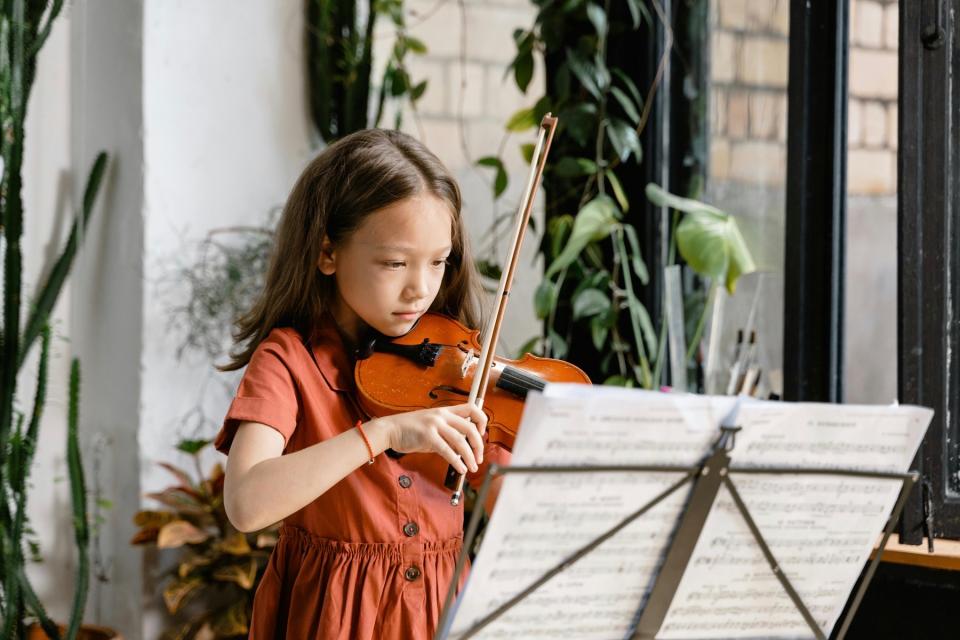
To nurture this PCE, show support for some of the traditional official high school experiences. “Prom, pep rallies, and homecoming—everyone unites around these high school touchpoints,” notes Dr. Profito. “It gives teens something to plan for and talk about, so they feel like they are connected.”
Finding a smaller, close-knit community within the larger school community is also huge. “Making sure that your child has access to peers is important,” says Dr. Harris-Britt. “So is making sure they have access to organizations that they really care about.
“Some kids have incredible talents! If they're great at music or a particular sport, or they're highly motivated to do things in the community, you can build into those individual talents. That is a protective factor. If your kid is really good at soccer, make sure that the soccer schedule doesn't get disrupted. Having an interest is very stabilizing.”
Dr. Harris-Britt adds, “On the flip side, when kids don't have an interest, that's when we see them channel their need for control in other ways. They may internalize their feelings as anxiety or depression, act out, or develop substance use, eating disorders, or other problems.”
Dr. Harris-Britt asks, “How do we teach children, from an early age, how to connect with other people? I think we first have to model it as adults and then provide opportunities for it.
“Post-divorce, resources like time and money become more limited, so the children's ability to be able to do Boy Scouts or Girl Scouts may be at risk. Each parent has to figure out how to navigate picking up two kids from different activities. When the parents were in the same household, they could divide the tasks, but not anymore. But it’s so important to keep children’s lives as consistent as we can.”
“It would be positive if parents decide to live near each other,” adds Linda Schofel, a family law attorney and licensed clinical social worker. “Then the kids could still have the same group of friends, and it would be easy for Mom or Dad to transport the kids to play dates. Close enough to make it convenient for the child to be on a team sport and not feel divided.”
“You can also gently help your child curate their friend group,” suggests Dr. Profito. “Sometimes, kids continue feeling rejection, abandonment, rejection, abandonment, as their maybe-not-so-great friends kind of come and go. You can guide them towards healthy friendships with teens who treat them well.
“But you don’t have to tell them directly, ‘Don’t be friends with that girl.’ Instead, it’s about planting seeds and asking the questions they might not be thinking of, and gentle nudges and empowerment.
School counselors, teachers, mentors, and coaches can also help kids feel like they belong. Dr. Profito says, “It's not just peers that create that sense of, ‘When I go to school and I'm away from my family, I still feel connected. I've got someone I can go to for help, support, advice.’”
“There is also a lot of research out there that talks about the importance of extended family—in particular, grandparents,” says Dr. Harris-Britt.
“We know that when children have grandparents present in their lives, they have higher levels of social competence and self-esteem. That connection to the history of the family is a protective factor for them.
“The kids who I see really flourish are the ones whose parents allow contact with the grandparents, regardless of whose time it is. Or the grandparent is a part of their schedule, like taking the kid to music lessons every Wednesday after school. It's all about consistency and connection.”
Dr. Profito agrees. “Most of the time, grandparents are super happy to have grandkids, and happy to watch the recitals and go to the games and just be present, and they've got time to do that because they don't have to worry about cooking dinner for the whole family later.
“We also have organizations like Big Brothers Big Sisters, mentorship organizations, outreach clubs, etc.”
Dr. Harris-Britt adds, “A non-parent adult could also be a music teacher. Or an art teacher. That's why you want to make sure kids can still engage in their extracurricular activities, so that they can find those trusted adults outside of just you.”
This PCE might seem complicated in a co-parenting context. What if only one parent is supportive, so only have the child’s homes have that adult that makes them feel safe?
The answer is good news: Having one supportive parent makes a world of difference. Based on what I’ve read in the research and what I have witnessed firsthand, if one parent provides PCEs, that’s enough to make that child feel safe, protected, loved, important, and valued. Even when your child is at their other home, they're still going to have that connection. They're going to be able to develop healthy attachments in the future because they have a healthy relationship with you.
If one parent uses the 3 C's—communication, cooperation, and compromise—to manage co-parenting conflict, then the child will grow up feeling safe and protected. Even using a co-parenting app, like OurFamilyWizard, can protect your child. “When parents use OurFamilyWizard,” says Linda, “that creates a positive experience for their children, because parents communicate through the app rather than showing conflict.”
Every family is different, and it could be either parent providing stability. Maybe the other parent is disconnected from the kids because they have mental health issues, or addiction issues, or they’re wrapped up in their career and they think they can make up for the disconnect by taking the kids to Disneyland.
But if you're meeting your children’s needs—emotional and physical—then they’re going to be ok, even if life at the other parent’s house is rough. If your co-parent is less connected as a parent, your love and all the other PCEs are protective factors that accompany them wherever they go.
What does feeling safe and protected at home look like?
Physical safety means a complete lack of violence or physical harm in your home. (If you suspect the situation is different at your co-parent’s, report it.)
“Psychological safety, on the other hand, means you feel safe to share,” says Dr. Profito. “Safe to talk about things, safe to take up space. And I will make sure that nobody is encroaching on that and taking that away from you, that nobody's trying to silence your voice or diminish you in any type of way.”
Feeling safe also means relying on a routine you can trust. But in the middle of a chaotic divorce, the most basic things can be overlooked—like getting to school on time, packing a lunch, or making sure homework is completed—just because there's so much conflict. It’s easy to fixate on what is or isn’t fair and what you do or don’t deserve, but the truth is that none of it is fair to the kids.
Focusing on the best interest of the child also means providing a consistent, reliable structure to their days, as well as taking them to their well-child appointments at the pediatrician and putting them in therapy if they’re struggling.
Where did the ACE and PCE research come from?
The concept of PCEs is relatively new. The original ACEs study was conducted by the Centers for Disease Control and Prevention (the CDC) and Kaiser Permanente back in the mid-90s, and the study on positive childhood experiences or PCEs wasn’t conducted until 2019. It's a growing field. There's more research being conducted. Day by day, we're learning more and more.
The research team at Johns Hopkins University polled a little over 6,000 adult participants, and they asked them about their childhoods.
If you were to ask a random person, “Oh, what are your positive childhood experiences?” They'd probably say, “Oh, birthday parties and gifts and trips and special treats”—all sorts of tangible things.
But the researchers asked much more nuanced questions, and they narrowed down these seven experiences that are directly related to feeling connected, supported, and included—all the really important things in life.
PCEs set your kids up to be resilient, happy, healthy adults—even if the divorce was traumatic
People who have had positive childhood experiences feel supported and connected because they feel like they’re a part of a community, and they know how to seek out help when they need it. They have coping skills and social support.
No matter how traumatic your divorce was for your kids, the PCEs are seven straightforward ways you can support their healthy emotional development and protect their mental, physical, and social health—not just now, during this difficult time, but also throughout their whole lives.

